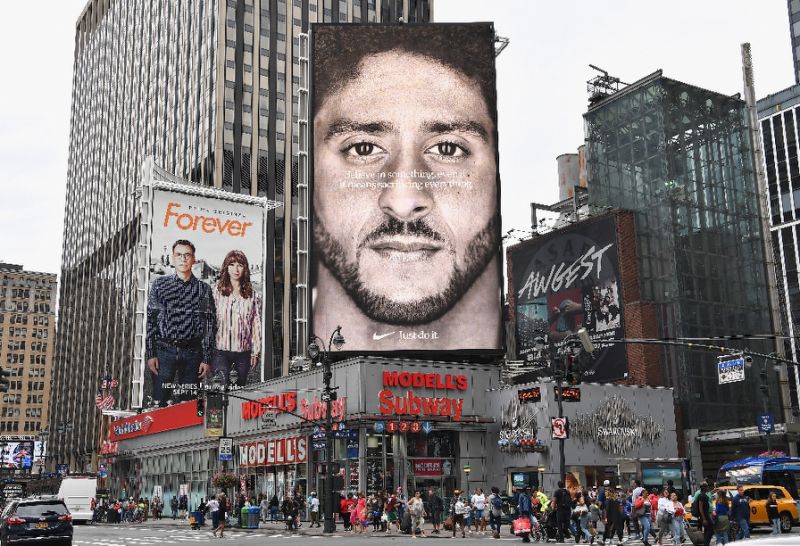“Believe in something. Even if it means sacrificing everything.” These words, positioned across the face of Colin Kaepernick, have taken the nation by storm since Nike named the former San Francisco 49ers quarterback one of the faces of its 30th anniversary of their Just Do It campaign on September 3.
Kaepernick gained national attention during the 2016 pre-season of the National Football League when he knelt during the national anthem, protesting racial discrimination and police brutality against unarmed African-Americans.
Protests immediately broke out upon the release of the ad. Consumers began cutting the Nike logo off of their clothing and burning pairs of Nike shoes. Universities announced their refusal to carry and sell Nike apparel on their campuses. Local politicians banned the purchase of Nike products by clubs using public recreation facilities.
Even President Donald Trump weighed in, claiming that Nike’s decision to include Kaepernick in the Just Do It campaign was a “terrible message” in an interview with the Daily Caller.
Believe in something, even if it means sacrificing everything. #JustDoIt pic.twitter.com/SRWkMIDdaO
— Colin Kaepernick (@Kaepernick7) September 3, 2018
However, while Nike stock values initially tumbled by approximately 3 percent in the days following the announcement, brand exposure from TV, radio, online and social media coverage has since been valued at $163.5 million, according to Apex Marketing Group.
Memes quickly overtook the internet, allowing social media users to parody the advertisement on their own initiative and furthering the ad’s overall reach.
Online Nike sales also jumped by 31 percent over Labor Day weekend after Kaepernick’s ad campaign was released, practically doubling the 17 percent increase that took place over the same time period in 2017, data from Edison Trends reported.
The Just Do It campaign featuring Kaepernick and the economic trends that have emerged from it so far raise an interesting point about the correlation between freedom of speech and the economy. Ultimately, brands are left to walk a fine line between taking sides on contentious issues while also meeting and maintaining their economic quotas.
According to marketing experts, a thorough understanding of company consumer bases is critical for brands to determine which controversies they should or should not partake in.
“For the most part companies focus on their core targeted demographic and potential shareholder reaction when determining the preferred course of action to any potential marketing campaign,” David Carter, a sports marketing professor at the University of Southern California, told The Globe Post. “Some brands, based on these core constituencies prefer to avoid controversy, while others use them to define or reinforce their brand.”
In Nike’s case, its key target market consisting of younger, more politically conscious customers worked to its advantage, allowing the company to embrace the Kaepernick controversy head-on, Marvin Ryder, a marketing professor at McMaster University, told The Globe Post.
“If Nike’s target market was a 65-year-old conservative Christian kind of person, they couldn’t have picked a worse way to communicate to them,” Ryder said. “But because their target market skews younger, skews edgier, skews topical, I think they picked a brilliant way to do it.”
Acknowledging that the advertisement was risky, Larry Miller, the president of Nike’s Jordan Brand, told the AFP that supporting Kaepernick was “absolutely what Nike should do” in terms of their advertising presence.
“It was a risk, but that is what makes me proud to be a part of Nike because Nike was willing to take that risk to support an athlete who was making a statement he believed in, and we wanted to make sure he had an opportunity to voice that opinion,” Miller said.
Given that the initial backlash to the Kaepernick ad was “tepid at best,” in his opinion, Ryder explained that sales lost from disgruntled customers outside of Nike’s target realm are of little concern to the company, especially considering the revenue bump coming from new customers rallying behind them.
“Those [potential] customers that have become disenfranchised are of secondary importance to the company,” Carter added.
Attention surrounding the Kaepernick ad has also prompted reevaluation of the role that brands and institutions play in the advancement of free speech and human rights issues.
As the recipient of the 2018 Ambassador of Conscience Award from Amnesty International, Kaepernick’s commitment to the movement against racial discrimination and police brutality “has proved to be all the more remarkable because of the professional costs to him, and of course then the alarming levels of vitriol that it attracted from people in power,” Augusta Quiney, director of art for Amnesty International, told The Globe Post.
Despite Nike’s controversial history surrounding the production of their apparel, Quiney said the company’s inclusion of Kaepernick in its advertising is a step in the right direction in terms of the role that businesses should be playing in defending human rights.
“Nike’s record on human rights is imperfect,” Quiney said. “But it’s really refreshing to see a major multinational corporation use its global brand, its immense power and influence, to stand up not only for free speech but for justice and equality.”
Impending action from the NFL will also be something to watch in the coming months to shed light on its commitment to the promotion of free speech.
Given that Nike is the official apparel provider for all 32 teams in the league and that Kaepernick has filed an ongoing grievance against league owners for collusion, only time will tell regarding how the Kaepernick ad impacts NFL ratings and ticket sales.
“Nike would not have gotten the approval of the NFL to use this campaign, but I think what the NFL is going to do is they’re going to see what impact does it have in terms of filling the seats,” Ryder said.
The NFL did not respond to comment on what affect the Kaepernick ad will have, if any, on Nike’s relationship as an apparel provider for its teams. However, the league put out the following statement on September 4, the day after the ad’s release.
“The National Football League believes in dialogue, understanding and unity,” Jocelyn Moore, the NFL’s executive VP of communications and public affairs said in a statement. “We embrace the role and responsibility of everyone involved with this game to promote meaningful, positive change in our communities. The social justice issues that Colin and other professional athletes have raised deserve our attention and action.”
Regardless of the potential economic impacts that siding on political issues may cause, Quiney encouraged other brands to follow suit of Nike’s actions and to play a larger role in supporting human rights.
“Corporations really can’t just sit on the sidelines anymore,” Quiney said. “Like all the rest of us, they have a responsibility to do the right thing.”
















